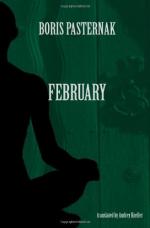|
This section contains 281 words (approx. 1 page at 300 words per page) |

|
Pasternak in The Blind Beauty has sought to adjust the native laws of Shakespearean drama to the Russian historical stage. The adaptation is evident in the central importance accorded theatricality in The Blind Beauty, in the weight given to political and historical parallelism, in the range of characters from noble to peasant, in the themes of genealogical taint, institutional corruption, unchecked violence and predetermined restraints on freedom of action.
It is all the more evident the closer one looks at Pasternak's writing, most persuasively so in Pasternak's use of language in the play. If "language is half a cemetery," as Pasternak noted in connection with his studies of Symbolism in 1912, then each word has its history, each has its own tale to tell. In his notebooks for 1941–1942, when he was first translating Shakespeare, we find Pasternak recording: "The ingenuity of language lies not in its soaring poetic quality...
|
This section contains 281 words (approx. 1 page at 300 words per page) |

|


